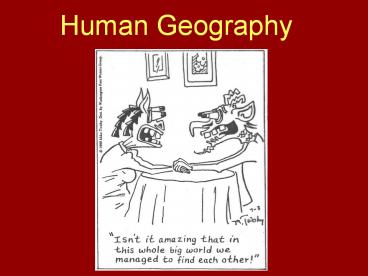Human Geography - PowerPoint PPT Presentation
1 / 30
Title: Human Geography
1
Human Geography
2
Geographical Perspective
- Understanding change over time is critically
important - Immanuel Kant argued we need disciplines focused
on the perspectives of time
3
Immanuel Kant and Geography
- I treat Geography not with the completeness
and philosophical exactitude in each part, which
is a matter for physics and natural history, but
with the rational curiosity of a traveler who
collates his collection of observations, and
reflects on its design.
4
Geographical Perspective
- Human geography melds many disciplines
- Offers insights into subject matter covered by
other disciplines - Seeks to understand changing spatial arrangements
over time - Sometimes described as the why of where
- During the 1980s, campaigns began to reintroduce
geography into school systems - National Geographic Society
- Led the campaign to encourage education in
geography - National Geographic Society introduced the Five
Themes of geography
5
Five Themes
- Location
- Human-environment interactions
- Regionled to regional science
- Place
- Movementmobility of people
- Left out landscape!
- The material character of a place
- This class revolves around each theme
6
Five Themes
- Integration in place
- How and why people or things found in the same
place influence each other - Interdependencies between places
- Nature and significance of patterns and networks
that tie places together - Interdependencies among scales
- Tied to geographys spatial perspective
7
Geographys Importance
- Allows unique insights by focusing on spatial
organization and material character of Earths
surface - Examples where Geography helps
- Assess impacts of changing political boundaries
on citizenship - Assess where medical facilities should be located
for given population (and in the future!) - Develop land-use maps
- Can answer questions about what future actions
may have on environment and humans
8
Using Spatial Perspective
- Maps and geography are seen as synonymous
- Why?
- What is a map?
- Map making is as old as geography itself
9
The First Map??
10
Using Spatial Perspective
- Maps have been used many ways
- Geographic Information Systems (GIS)
11
Using Spatial Perspective
- Geographers study BOTH the physical and human
properties of places - Earth's surface, elevation and relief,
atmospheric conditions, etc. - Settlement layouts, population patterns,
transport networks, land use, etc. - Geographers have a special interest in the
quality of places - Location plays a key role (remember absolute
relative?)
12
Maps and Regions
- Help define and delimit a region
- How do we delimit regions?
- Example...
13
(No Transcript)
14
Maps and Regions
- All regions have area, location, and boundaries
- Formal regions are homogeneous in either physical
or cultural characteristics - Physical criteria, e.g., desert basins
- Cultural criteria, e.g., a region within which a
certain language, say Basque, is spoken by about
90 percent of the people - Functional regions
- The product of interactions, and movement of
various kinds - Cities with surrounding areas of interaction
- A spatial system, its boundaries defined by the
limits of that system
15
Formal Region
Functional Regions
16
Maps and Regions
- Perceptual regionsprimarily in the minds of
people
17
Maps and The Human Mind
- Our egocentric viewpoints
- Shaped by our cultural environment?
- Humans have a built-in cultural bias
- Examples Mexico and Egypt
- Mental maps
- The map a person carries in their mind
- Derived from visual observation of the real world
- Developed over years of seeing maps
- People use them everyday
- Vague mental maps can lead to major policy
mistakes - Berlin conference in 1884
18
Maps and The Human Mind
- Environmental perception
- Generated from our mental map
- Perceptions of a place never visited may be quite
different from reality
19
(No Transcript)
20
Maps and The Human Mind
- Need more than absolute location
- Maps offer us a lot of information, but how can
we understand the cultural (or physical?) without
being there? - The map is our window on the world
- If you could move to any place of your choice,...
where would you like to live?
21
(No Transcript)
22
(No Transcript)
23
Human Geography Terrorism
24
Actual Tube Routes
25
Nearby Attractions
26
Non-executed Attacks
27
Greater London
28
Formal Region Cut-off
29
Discussion Questions
- The editor of a city newspaper has appointed you
to her staff, and your first job as a geographer
is to draw a map of the region within which the
paper sells (its market). - How will you go about doing this?
- When you finish your map, you notice the region
is sort of asymmetrical the paper sells 100
miles north of the city, but only 60 miles to the
south. - What could explain this variable reach of the
newspaper?
30
Discussion Questions
- Imagine yourself living and working in a small,
rural town. Your family owns and operates a
small department store located at the busiest
intersection in town, where the through-road
crosses the main shopping street. Now the State
Highway Department is building a four-lane
highway that will bypass your town by six miles. - How will this change your stores relative
location? - How will it affect your market?
- What might you and other shop owners do to
counter the impact of the new highway?































